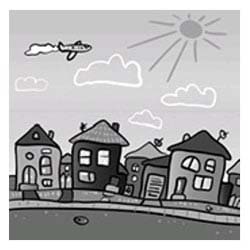
Before you settle down in any new place, you need to take a look at your lifestyle. Are you a city person? Do you like to be within walking distance of everything you need? If you enjoy a quick walk down the block to buy a newspaper and coffee, and you like being with lots of people, then urban life may be for you. The upside of life in the city is convenience. It’s nice to be close to all the things you enjoy: museums, shopping, movies, libraries . . . and work. And the mass transit system in a city makes it simple to get around.
On the other hand, life in the suburbs is often part of the white-picket-fence American Dream. Suburbs are areas just outside the city where homes are usually larger, and there’s more open space. Instead of stores within walking distance, there are shopping malls you drive to. Homes often have large yards for flower and vegetable gardens. Many houses have patios to enjoy outdoor living.
Apartments in the suburbs are usually larger, too, and there are often areas for playgrounds, parking, and cooking out. Suburbs where there are many commuters who travel to jobs in the city are sometimes called “bedroom communities.” People work in the urban areas, but they return to their suburban homes to sleep. The upside of suburban life is the space and privacy from nearby neighbors. The downside is that people often need a car to get around.
If you really want to get away from it all, you may decide that life in the country is for you. Picture the rolling hills and miles of farmland. Listen to the sounds of birds. Ahh, peace and quiet! But unless milking cows is your idea of the dream job, you may want to think carefully about living in the country.
ALAN: Lia, since that apartment in the ’burbs wasn’t what you’re looking for, have you thought about trying to find a place a little closer to the city?
LIA: I really think that’s what I need to do. The suburbs are beautiful, but there wasn’t one store nearby. The kids couldn’t easily walk to a friend’s house—we’d have to arrange play dates. And I think getting to work would be a huge headache.
ALAN: Yeah, the city really is great for kids to make lots of friends. They just walk outside! We didn’t worry about play dates when I grew up in a big city.
LIA: It would be nice to have a big garden, but there are too many downsides to the suburbs.
ALAN: I think you’ve decided already. You’re a city person!
LIA: Yeah, I think I am.
ALAN: I guess this means you haven’t thought about life in the country with mooing cows and clucking chickens?
LIA: Well, you never know what kind of neighbors you’ll have in a big city apartment!
| Tip 3 |
Because kids in the suburbs often can’t walk to a friend’s house, their parents arrange a specific day and time for a visit. It’s considered polite to take turns hosting the kids: One week it’s her turn, at her house; the next week it’s your turn, at your house. (We know which one we prefer!) |
| Tip 4 |
Each language has its own way to describe the sounds that animals make. In English, onomatopoeia is the term used for writing a word that is the sound it makes (for example, cluck, moo, and buzz). |
|
’burbs: suburbs
city person: someone who is most comfortable in a city
country: an area with farms, few homes, and lots of open space
get away from it all: leave responsibilities and relax
headache: something complicated and annoying
lifestyle: the way people choose to spend their time
mooing and clucking: sounds made by cows and chickens, respectively
open space: land in its natural state
patio: an area outside a house, often paved, for relaxing
peace and quiet: a calm environment
play date: an arranged play time for children
rolling hills: an area of small hills and fields
settle down: become established, start a new normal life
specific: exact
urban: having to do with the city
within walking distance: easy to walk to
|

